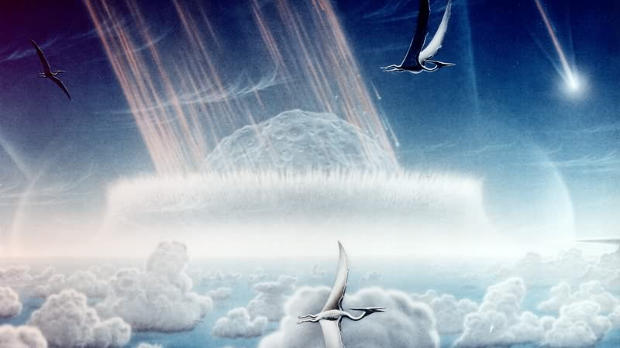 WIKIMEDIA, DONALD E. DAVISA giant asteroid slammed into the Earth in the area of today’s Yucutan Peninsula 66 million years ago. The dramatic event has, for decades, been posited as the reason that many dinosaurs—along with scores of other fossil species—went extinct. But at least for dinosaurs, that galactic catastrophe may have been less of an instantaneous apocalypse and more of a final death blow to species already in slow and steady decline, according to a study published in PNAS yesterday (April 18). In it, researchers in the U.K. proposed that many dinosaur species were in pretty bad shape for at least 48 million years prior to the asteroid’s impact.
WIKIMEDIA, DONALD E. DAVISA giant asteroid slammed into the Earth in the area of today’s Yucutan Peninsula 66 million years ago. The dramatic event has, for decades, been posited as the reason that many dinosaurs—along with scores of other fossil species—went extinct. But at least for dinosaurs, that galactic catastrophe may have been less of an instantaneous apocalypse and more of a final death blow to species already in slow and steady decline, according to a study published in PNAS yesterday (April 18). In it, researchers in the U.K. proposed that many dinosaur species were in pretty bad shape for at least 48 million years prior to the asteroid’s impact.
“One of the things that has been long debated about dinosaur evolution is whether they were reigning strong right up until the time of the meteorite impact, or whether there was a slow, gradual decrease in [the emergence of new species] or an increase in extinction before that time,” study coauthor Chris Venditti, an evolutionary biologist at the University of Reading, told The Guardian.
“We were not expecting this result,” said study coauthor Manabu Sakamoto, also of Reading, in a statement. “While the asteroid impact is still the prime candidate for the dinosaurs' final disappearance, it is clear that they were already past their prime in an evolutionary sense.”
Sakamoto, Venditti, and University of Bristol paleontologist Michael Benton modeled the rates of dinosaur speciation events ...













